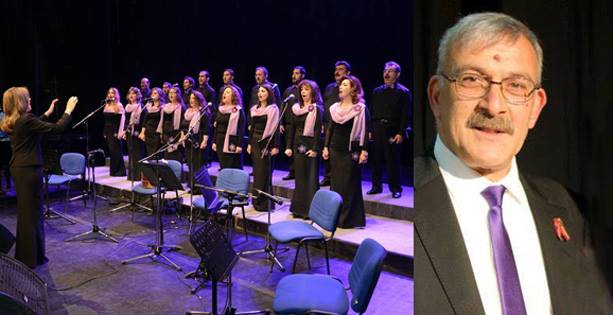Jordan’s Yerevan Choir performs in Armenia for the first time

The Yerevan Choir of the National and Athletic Union of Jordan was one of the participants of the “We Sing Komitas” Pan-Armenian Festival held by the RA Ministry of Diaspora. The choir was established through the efforts of Karnig Sosoian in 2008.
“I gave my first performance in Armenia on the sidelines of the festival, and it was made possible thanks to the efforts of the choir’s artistic director and choirmaster Varduhi Toroyan. Prior to that, the choir had also given performances at club and community events and festivals in Amman,” said member of the National Athletic Union of Jordan and member of the Armenian Genocide Centennial Regional Committee Hagop Hagopian.
The choir is co-ed and has many members, but came to Armenia with 12 people, of which 4 are Arabs who left Armenia with brilliant impressions. Some of the members of Yerevan Choir also sing in the State Choir of Jordan.
This year marks the 60th anniversary of the National and Athletic Union of Jordan. Established in 1955, the Union carries out activities, the core of which is to stay true to the national image and traditions.
“The Union is trying to become a home for Armenians in the Diaspora and consolidate Armenians around the Union, that is, traditions and cultural events. The Union has a Spitak Dance Ensemble, which participated in the “Im Hayastan” (My Armenia) Pan-Armenian Festival held by the RA Ministry of Diaspora in 2013. The dance ensemble participates in community events and during events devoted to state holidays. The Union also has the Hakob Paronyan Theater Company, which has staged and presented 10-12 plays in Jordan and abroad throughout the past 50 years of its existence. The theater company recently presented the play “Arshak II” in Damascus,” Mr. Hakobyan mentioned.
As a member of the Armenian Genocide Centennial Regional Committee, Hagop Hagopian has participated in the events held by the Armenian community of Jordan on the sidelines of the events dedicated to the Centennial of the Armenian Genocide. He has given lectures devoted to the Armenian Genocide and has had meetings and conversations with young Armenians who, according to Hagopian, will inherit the wealth of Armenian culture and traditions.
“What concerns us the most today is the native language. Unfortunately, most young Armenians don’t know Armenian. They can only participate in simple and daily conversations at best, and this is the flaw that the Union is trying to fix through various events and activities,” Hagop Hagopian concluded.
Lusine Abrahamyan




 Արևելահայերեն
Արևելահայերեն Արևմտահայերեն
Արևմտահայերեն Русский
Русский






